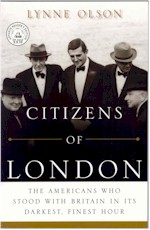 |
|
|
| ||||||
|
|
This page is the original source of this review, though you may also find it on Amazon or other sites. | ||
| Book Reviews Home | Free Audio Books | |
 |
Book Review of: Citizens of LondonThe Americans Who Stood with Britain in its Darkest, Finest Hour Price:
$18.48 Availability: Usually ships
within 24 hours |
| Review
of
Citizens Of London, by Lynne Olson (Hardcover, 2010) (You can print this review in landscape mode, if you want a hardcopy) Reviewer: Mark Lamendola, author of over 6,000 articles. Superlatives fail me. To call this book a masterpiece is not giving it enough credit. This book sets the bar for nonfiction. Kudos to author Lynne Olson, the editor, publisher, and everyone else involved in putting together one of the best books to emerge in recent times. I don't have negative comments on this book. Factual errors drive me up the wall, and if this book had any I didn't spot them. I can predict the likely occurrence of errors, just by looking at the bibliography. Most authors use tertiary sources or worse. Olson used a mind-boggling quantity of primary sources. The author pushes no personal agenda or the agenda of any particular group or affiliation. The book is what the title, subtitle, and jacket blurb say it is--but better. It's refreshing to feel, after the first chapter, that you can trust the author. That's a huge plus, but combine that with a writing style that is silky smooth and you just go through 400 pages in what seems like very little time. So much for the gushing praise. What's in the book? It consists of 22 chapters in 397 pages. It has a 50-page bibliography--can you say "well researched?" The chapters provide vivid accounts of American citizens working in London to help pull Britain through World War II. It does that in chronological order, so a chapter by chapter analysis isn't necessary here. The Americans followed by the book are:
In this book, we read about affairs, political intrigues, personal despair, personal triumph, desperation, sacrifice, cunning, and generosity. The United States was very slow to emerge from its isolationist cocoon and assist Britain, which was the last European nation left standing between Hitler and complete domination of Europe (and much of Asia). Had Britain fallen, the United States probably would not have been able to defeat Hitler on its own. This point wasn't acknowledged in the USA, and Britain was facing a sure end without an alliance. Winant, Harriman, and Murrow were instrumental in getting the USA to assist Britain to begin with. They were further instrumental in making the alliance work after the USA declared war on Germany.
In the telling of the story, Olson gives us "behind the scenes" views of other key Americans such as FDR, Eisenhower, and Truman. We don't get just a mention of Winston Churchill, we get introduced to much of his family and see how they dealt with the war as well. And we get an understanding of just how rough the British had it as their six years of World War II dragged on and on. The interplay between FDR and Churchill is especially interesting. FDR was arrogant (the cousins who were the Teddy Roosevelt heirs did not like him--the rancor was rather strong), and his treatment of Churchill was shabby at best. I was pleased to see Olson didn't gloss over this, but just told it like it was. You can't go wrong by adding this book to your history collection. If you don't already have such a collection, I can't think of a better book with which to start one. | |
About these reviewsYou may be wondering why the reviews here are any different from the hundreds of "reviews" posted online. Notice the quotation marks? I've been reviewing books for sites like Amazon for many years now, and it dismays me that Amazon found it necessary to post a minimum word count for reviews. It further dismays me that it's only 20 words. If that's all you have to say about a book, why bother? And why waste everyone else's time with such drivel? As a reader of such reviews, I feel like I am being told that I do not matter. The flippancy of people who write these terse "reviews" is insulting to the authors also, I would suspect. This sound bite blathering taking the place of any actual communication is increasingly a problem in our mindless, blog-posting Webosphere. Sadly, Google rewards such pointlessness as "content" so we just get more if this inanity. My reviews, contrary to current (non) standards, actually tell you about the book. I always got an "A" on a book review I did as a kid (that's how I remember it anyhow, and it's my story so I'm sticking to it). A book review contains certain elements and has a logical structure. It informs the reader about the book. A book review may also tell the reader whether the reviewer liked it, but revealing a reviewer's personal taste is not necessary for an informative book review. About your reviewer
About reading styleNo, I do not "speed read" through these. That said, I do read at a fast rate. But, in contrast to speed reading, I read everything when I read a book for review. Speed reading is a specialized type of reading that requires skipping text as you go. Using this technique, I've been able to consistently "max out" a speed reading machine at 2080 words per minute with 80% comprehension. This method is great if you are out to show how fast you can read. But I didn't use it in graduate school and I don't use it now. I think it takes the joy out of reading, and that pleasure is a big part of why I read. |
| |||||